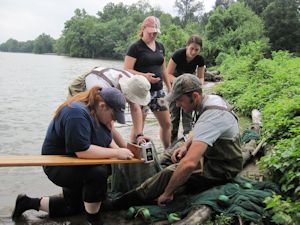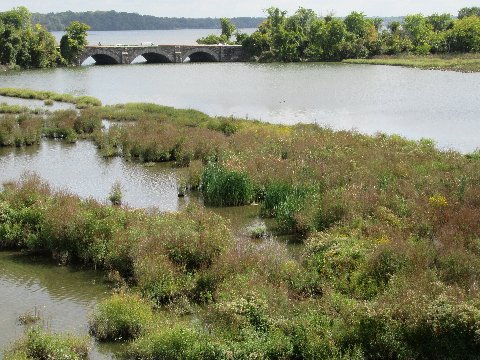Dr. Kim de Mutsert, Assistant Professor, George Mason University (GMU), gave a presentation to the Friends of Dyke Marsh, the Potomac Riverkeeper and the Northern Virginia Conservation Trust on November 15, 2017, examining the health of Hunting Creek, a tributary of the Potomac River just north of Dyke Marsh. This stream receives treated wastewater from the Alexandria Renew Enterprises wastewater treatment plant and untreated stormwater runoff. Since 2013, Alexandria Renew has funded GMU’s Potomac Environmental Research and Education Center to monitor water quality and the biological communities of Hunting Creek.
Here are a few points that Dr. de Mutsert made:
- Her team has found fecal bacteria and micropollutants in elevated levels at all sampling sites. They have confirmed micropollutants from human use products like acetaminophens, caffeine, nicotine and anti-depressant medications. These enter the water from human excretions or because people dump them or flush them down toilets. Wastewater treatment technology does not fully remove them.
- The levels of E. coli bacteria spike after precipitation events.
- Among the fish species they have observed are banded killifish, large-mouth bass, sunfish, striped bass and four herring species (American shad, alewife, blueback herring and hickory shad).
- They observed that Cameron Run is used by small spawning populations of river herring (alewife and blueback herring). River herring numbers have been reduced throughout the Northeast by pollution, over-fishing and dams, among other factors.
- Submerged aquatic vegetation (SAV) is increasing. Fish use SAV as habitat, to hide from predators.
 George Mason University scientists and students survey fish in Hunting Creek. Photo courtesy of Dr. Kim de Mutsert.“It’s a very resilient ecosystem. What we find what is representative of the freshwater tidal Potomac River,” she commented.
George Mason University scientists and students survey fish in Hunting Creek. Photo courtesy of Dr. Kim de Mutsert.“It’s a very resilient ecosystem. What we find what is representative of the freshwater tidal Potomac River,” she commented.
Her studies can help guide decision-making, especially Alexandria Renew’s wastewater treatment management.


